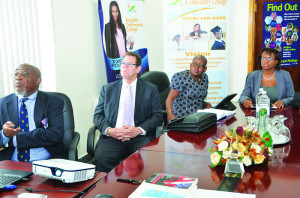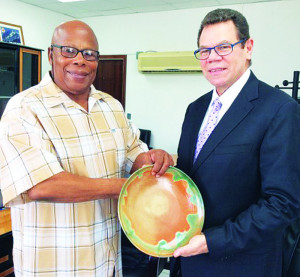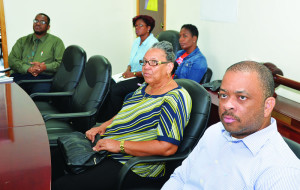
Staff and Board Members

(Photo Source: CDB’s website)
Government officials and media representatives in Anguilla have been told about the interest in, and support for, education and renewable energy in the island by the Caribbean Development Bank (CDB). The information was disclosed by the President of the regional institution, Dr William Warren Smith, during his visit here late last week.
The Anguillian first came into contact with Dr Smith and his accompanying team when they met at the Anguilla Community College with the President, Professor Delroy Louden, members of the Board of Governors and members of the college’s Management Team. Those with Dr Smith were: Ms Klao Bell Lewis, Head of Corporate Communications; and Ms Dorla Humes, Advisor to the President.
Professor Louden, in his presentation to the CDB President, gave an indepth account and analysis of the developmental needs of the Community College, its vision, mission, milestones, programmes and courses being offered, registration statistics, challenges, community linkages and collaborations, accomplishments, initiatives and the need for the college to have its own long-term premises. The CDB President was thanked for the bank’s approval of a loan of US$3.215 million for the construction of a purpose-built facility at Sandy Hill, across from the Long Path, on 11.97 acres of land.
Dr Smith said he was very impressed with Professor Louden’s comprehensive presentation, and spoke of the CDB’s commitment to the project and to education in Anguilla. He underscored his remarks when he met at a press conference, later, where he was welcomed by Chief Minister, Hubert Hughes, and spoke about other matters relating to his visit to Anguilla.
“We are here to express solidarity with you, and also to share with you some of the exciting new developments that are on the horizon especially for the small islands of the Eastern Caribbean,” Dr Smith stated. “Today (Friday, August 22) we have the opportunity to make a number of visits to some of the key partners. Chief Minister Hughes mentioned your Community College. We are very proud of that loan that we made to Anguilla for that purpose, because the Caribbean Development Bank has recognised that education is one of the pillars on which Caribbean prosperity and Caribbean economic and social progress is going to be built.”
The CDB President continued: “We have decided that that is going to be one of our focal areas. So we are happy to be able to meet with members of the Board and the leadership of that institution. We had a presentation which was, to say the least, extremely impressive and comprehensive of the work that is being done at that relatively new institution which is still in the early stages of development. We are proud to be associated with the enhancement of that institution’s work. I am happy that we will be able to go back to Barbados to report on the progress that has been made, and of the plans that are in development to take that institution forward.
“We also had the opportunity to visit with ANGLEC which is an institution with which we have worked in the past, and one with which we want to build a relationship in the future. We had an animated discussion with members of the Board and with the management and the technical staff of that institution. We talked a little bit about the developments that are on the horizon in relation to renewable energy.
“Renewable energy can be a game changer for the Caribbean. I have said so on a number of occasions, and we believe we are at that point where we will be able to make available the properly-priced resources to make renewable energy a reality in our Caribbean. The most exciting feature of that prospect is one that we outlined in our discussions with ANGLEC – and it has to do with geothermal. The Eastern Caribbean islands are very, very well endowed with geothermal potential. One nearby island which has that potential – and I believe it is fair to say it is pretty much proven by now – is the neighbouring island of Nevis.
“What it means is that even if Anguilla does not have the resource itself, it is within sufficiently close proximity to Nevis so that you can inter-connect to that country’s ultimate supply of electricity generated from geothermal. What does that means for your country? It means the prospect of lower cost of electricity. And what does lower cost of electricity mean? It means the prospect of greater competitiveness for your industries – including your vital tourist industry.
“CDB is going to be positioning itself to provide you and neighbouring Nevis with the wherewithal to develop that resource and the other countries of the Eastern Caribbean that have that potential. We have recently signed a Memorandum of Understanding with the Government of Japan, and also with the Inter-American Development Bank, which will provide us with very, very attractively priced financing for renewable energy. I am looking forward to the time when those arrangements are actually finalised so that the resources can start to flow to our borrowing member countries.
“Our region has gone through a very difficult period of adjusting to, first of all, the international financial crisis and, more recently, the international economic recession. But we can’t languish in the difficulties of those times. We need to move forward – and the way to move forward is to take advantage of the emerging opportunities to change the nature of the game in our countries. That is what we are in Anguilla to talk about, and we are confident that we will be able to help Anguilla to change the nature of its circumstances and move towards a better future.”
Meanwhile, in speaking about renewable energy, the CDB President, replying to a question from one of the media representatives, said the discussions with ANGLEC also touched on solar energy which is being used in Anguilla to some extent.
Dr Smith and his team also met with Governor Christina Scott. “It was a very good meeting with the Governor and we were able to exchange views with her on a number of matters of importance to Anguilla, and matters that are also important to the Caribbean Development Bank,” he disclosed. He said the United Kingdom was a very important shareholder of the CDB and that the bank had an interest in maintaining good relations with the Government of the United Kingdom.
“We exchange views with them; we provide advice and they also advise us,” he added. “We look forward to working with all aspects of the Government here in Anguilla and we want to take the opportunity to thank you, Chief Minister, for inviting me and my colleagues. We consider it a very special privilege, and we want you to know that we consider you to be a very special friend of CDB – and I also consider you to be a good personal friend.”









